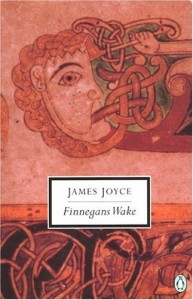 It was raining, and the popular Java Beach Cafe had a line running out the door. Dan Brady and I had passed another cafe about a block away that looked pleasant and empty and decided to try it. Can’t remember the name of it now—something like Beach Cafe—with southern food like fried chicken and waffle; and a cotton candy machine. We found a nice corner in front of a shelf full of books and I took out Joyce’s Finnegans Wake. Dan and I would use the book to jump start some poetic exercises.
It was raining, and the popular Java Beach Cafe had a line running out the door. Dan Brady and I had passed another cafe about a block away that looked pleasant and empty and decided to try it. Can’t remember the name of it now—something like Beach Cafe—with southern food like fried chicken and waffle; and a cotton candy machine. We found a nice corner in front of a shelf full of books and I took out Joyce’s Finnegans Wake. Dan and I would use the book to jump start some poetic exercises.
Three women came over and sat at the table next to us. As I read a passage from the book, Dan began to write. I noticed at one point the women had stopped talking. They were attracted by the obscurity of my recitation as I navigated precariously from word to word, sounding out long running syllables, short exclamations, pausing at combinations that befuddled the mind. After two pages of reading I stopped. Then it was Dan’s turn to read while I wrote. At the end of his reading we read to each other what we had written and laughed at the strangeness of our “poems” that seemed to vibrate with a raw energy.
“Excuse me.” One of the women leaned over. “We have been watching you reading and writing. It seems like you are playing a most wonderful game.”
We talked about Finnegans Wake, how its obscurity helped us not to get stuck on the narrative but listen to the words and sounds and that propelled us to write down what we heard.
“Would you like to try?” I proposed.
They laughingly declined. “But you’d be sure we’ll be talking about you for days to come.”

